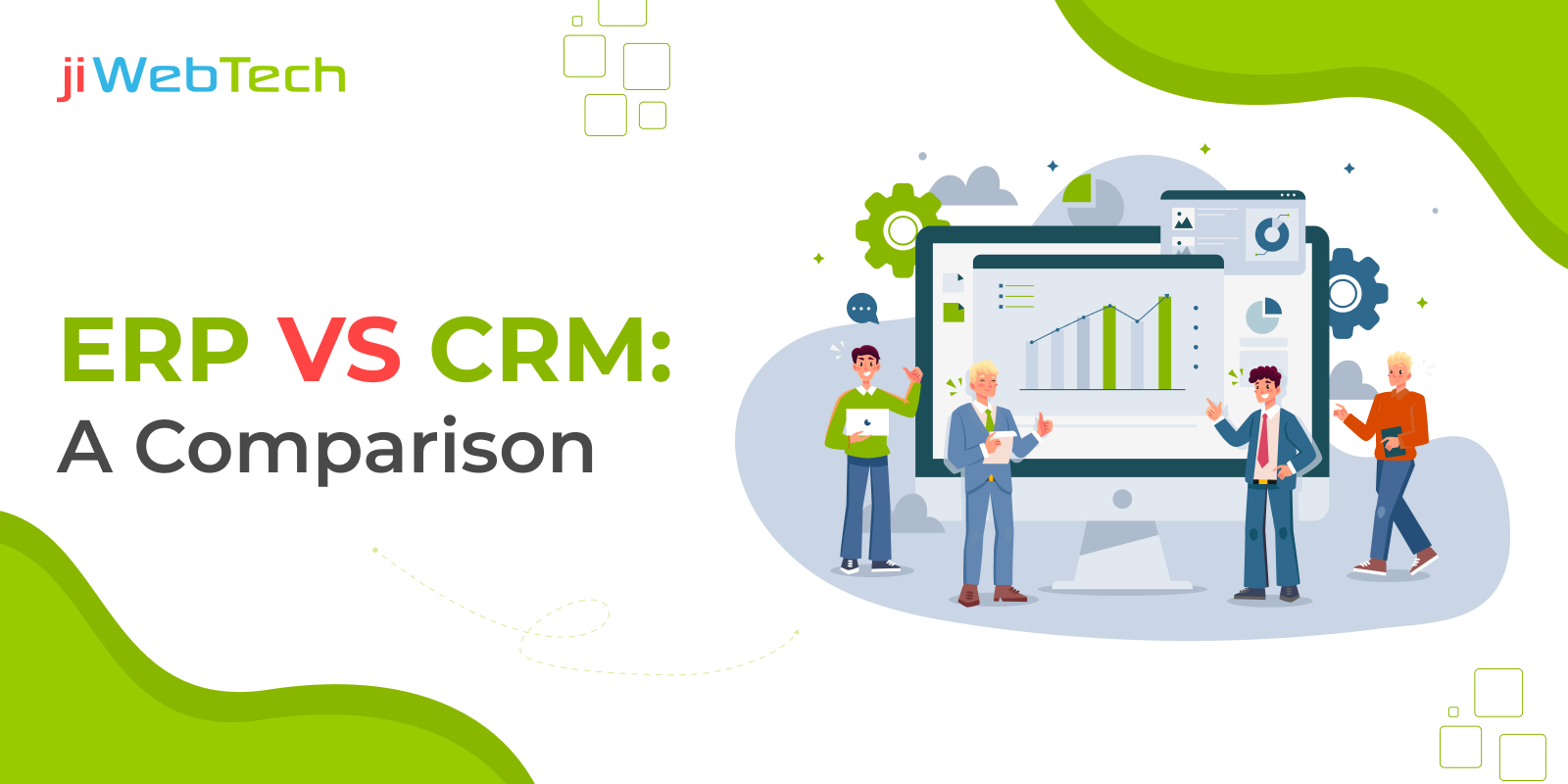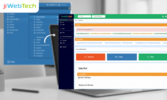- Sep 13, 2024
- Enterprise
- 3586
Share this post on:

Enterprise Resource Planning (ERP) and Customer Relationship Management (CRM) are two essential business management tools that have revolutionized how businesses operate. They both aim to improve the efficiency and productivity of an organization. However, there are significant differences between the two systems, and each serves a unique purpose.
Statistics: ERP vs CRM
Before moving further in this article, let us learn about the statistics related to ERP and CRM:
Market size and growth
The global ERP market was valued at $44.9 billion in 2020 and is expected to grow at a compound annual growth rate (CAGR) of 9.6% from 2021 to 2028.
The global CRM market was valued at $48.2 billion in 2020 and is expected to grow at a CAGR of 13.2% from 2021 to 2028.
Industry-specific applications
According to a report by IDC, 63% of businesses use industry-specific ERP software, while 44% use industry-specific CRM software.
Industry-specific ERP software is more common in manufacturing (80%) and wholesale distribution (77%), while industry-specific CRM software is more common in retail (61%) and professional services (58%).
ERP and CRM integration
A study by Software Advice found that 58% of businesses use integrated ERP and CRM systems, while 24% use standalone ERP systems and 18% use standalone CRM systems .
Integrated ERP and CRM systems are more common in medium-sized businesses (60%) and large businesses (75%), while standalone ERP systems are more common in small businesses (32%) and standalone CRM systems are more common in small businesses (41%).
Now that we have learned the statistics of ERP and CRM, let us now explore the major differences between ERP and CRM and decide which one is best for your business.
What is ERP?
ERP is a type of software that integrates all aspects of an organization's operations into a single system. It includes modules for financials, human resources, supply chain management, customer relationship management, and more. The primary goal of ERP business management software is to provide a unified platform for managing various business functions, allowing organizations to streamline their processes, improve productivity, and reduce costs.
Advantages of ERP:
Let us dive deep into the article and learn the advantages of ERP software development services :
1. Improved Efficiency: With an ERP system in place, businesses can automate many of their manual processes, reducing the need for paperwork, errors, and wasted time. This leads to increased efficiency and productivity across different departments.
2. Better Decision-Making: An ERP system provides real-time data and insights, enabling executives to make informed decisions based on accurate figures. This helps businesses adapt quickly to changing market conditions and stay competitive.
3. Enhanced Collaboration: ERP systems facilitate communication and collaboration among different departments and locations within an organization. This improves coordination, reduces misunderstandings, and helps teams work together more effectively.
4. Cost Savings: By automating tasks and reducing manual errors, ERP software development cost is reduced. They can also assist in optimizing inventory levels, reducing waste, and improving supply chain management, leading to further cost savings.
5. Flexibility and Scalability: ERP business management software is highly customizable, allowing organizations to tailor the software to their specific needs. This flexibility ensures that businesses can scale their ERP system as they grow, without needing to change software providers.
Disadvantages of ERP:
Let us dive deep into the article and learn the disadvantages of custom ERP software development:
1. High Implementation Costs: ERP implementations can be expensive, especially for larger organizations. The cost of licensing fees, hardware upgrades, and training can be a significant investment.
2. Complexity: ERP systems can be complex, requiring extensive planning, configuration, and customization to meet the specific needs of an organization. This complexity can lead to longer implementation times and higher maintenance costs.
3. Integration Challenges: Integrating ERP systems with existing legacy systems can be difficult, especially if those systems are outdated or incompatible with the new ERP software. This may require additional time and resources for migration and conversion.
4. Limited Flexibility: While ERP systems are highly customizable, they may not always accommodate changing business needs or adapt to new technologies. This can result in a less-than-ideal user experience or reduced functionality over time.
5. Security Concerns: With the increased use of cloud-based ERP systems, there is a risk of data breaches or cyber attacks, which can compromise sensitive business information. Organizations must ensure they have robust security measures in place to protect their data.
6. Lack of User Adoption: If employees are not properly trained or do not see the benefits of using an ERP system, they may be resistant to adopting it fully. This can lead to lower adoption rates and reduced efficiency gains.
7. Dependence on Technology: ERP systems rely heavily on technology, which can sometimes fail or experience issues. If these technological difficulties persist, they can disrupt business operations and impact productivity.
What is CRM?
Customer Relationship Management (CRM) is a strategic approach and a set of tools that help businesses manage and organize their interactions with customers, clients, and sales prospects. The primary goal of CRM business software solutions is to improve customer satisfaction, and retention, and ultimately, drive sales growth.
CRM systems are designed to consolidate customer information, streamline sales processes, and automate repetitive tasks, allowing businesses to better understand their customers’ needs and preferences. This, in turn, enables them to provide more personalized and efficient services.
CRM: The Three Main Categories
Operational CRM: This type of CRM focuses on the day-to-day tasks of a business, such as customer service, marketing, and sales. It helps improve efficiency and productivity by automating processes like order tracking, customer support, and lead management.
Analytical CRM: This category of CRM is concerned with analyzing customer data to gain insights into customer behavior, preferences, and trends. By using data mining techniques, businesses can better understand their customers and make more informed decisions.
Collaborative CRM: Collaborative CRM emphasizes improving communication and collaboration between different departments within a business, as well as with external stakeholders like suppliers and partners. This helps to create a more unified and consistent customer experience.
Advantages of CRM
Let us dive deep into the article and learn the advantages of CRM:
Improved customer service: CRM systems allow businesses to quickly access customer information, making it easier to resolve issues and answer queries. This leads to better customer satisfaction and loyalty.
Enhanced marketing efforts: By analyzing customer data, businesses can better target their marketing campaigns, increasing the chances of converting leads into sales.
Increased sales productivity: CRM tools automate repetitive tasks, freeing up sales teams to focus on building relationships and closing deals.
Better decision-making: With access to comprehensive customer data, businesses can make more informed decisions, leading to improved business strategies.
Streamlined operations: CRM systems help streamline business processes, reducing manual tasks and errors, and improving overall efficiency.
Disadvantages of CRM
Let us dive deep into the article and learn the disadvantages of CRM:
High initial cost: Implementing a CRM system can be expensive, both in terms of software and training costs.
Resistance to change: Some employees may be resistant to adopting new technology or changing their work habits.
Complicated setup: CRM systems can be complex, requiring time and expertise to set up and configure correctly.
Data privacy concerns: Storing customer data in a CRM system can raise privacy concerns, particularly if the system is not secure.
Ongoing maintenance: To ensure the system remains effective, businesses must regularly update and maintain their CRM software.
Difference Between ERP and CRM
Let us learn the major differences between ERP and CRM:
Scope of Functionality:
ERP systems focus on managing and integrating various internal business operations such as accounting, inventory management, human resources, and manufacturing processes. On the other hand, CRM systems primarily concentrate on managing and improving interactions with customers, including sales, marketing, and customer service.
Objectives:
ERP systems aim to optimize internal business operations and drive efficiency by reducing costs, errors, and manual processes. CRM systems, on the other hand, focus on enhancing customer satisfaction and loyalty by improving communication, understanding customer needs, and streamlining sales and marketing efforts.
Data Management:
ERP systems handle data related to production, finance, human resources, and other internal operations. CRM systems, however, store customer-related data such as contact information, purchase history, preferences, and interactions with the business.
User Base:
ERP systems are generally used by departments within a company, such as finance, production, and human resources. In contrast, CRM systems are primarily used by sales, marketing, and customer
Integration:
ERP systems integrate various internal business processes and data, while CRM systems focus on integrating customer-related data and processes. Although both systems can be integrated, CRM systems often act as a complementary tool to ERP systems.
Cost:
ERP systems tend to be more expensive due to their comprehensive scope and complex implementation process. CRM systems, on the other hand, are generally more affordable and can be implemented more quickly.
Complexity:
ERP systems are often more complex and require extensive training for employees to use effectively. CRM systems, while still requiring some training, are generally more user-friendly and can be adopted more easily by employees.
What to Choose: Factors to Consider
Consider the following factors before choosing between ERP and CRM
Business Size:
Smaller businesses may benefit more from a CRM system, as it can help streamline customer interactions and sales processes. Larger businesses with complex operations may require an ERP system to manage and integrate various internal processes.
Business Objectives:
If your primary goal is to improve customer relations and drive sales growth, a CRM system would be the better choice. However, if your objective is to optimize internal business operations and reduce costs, an ERP system would be more suitable.
Budget:
As mentioned earlier, ERP systems are generally more expensive than CRM systems. If budget constraints are a concern, a CRM system may be a more cost-effective option.
Implementation Time:
CRM systems can often be implemented more quickly than ERP systems. If you require a faster solution to address specific business needs, a CRM system may be the better choice.
Integration with Other Systems:
If your business already has an ERP system in place, a CRM system can be integrated to enhance its capabilities. However, if you are looking for a standalone solution, a CRM system may be the better choice.
Employee Training:
Consider the complexity of each system and the training required for employees to use them effectively. If your employees require minimal training, a CRM system may be more suitable.
When to Choose Each System:
ERP:
If your business has multiple departments or locations, and you need to streamline and automate operations across the board.
If you have a complex supply chain or manufacturing process that requires integration with other systems.
If you need to manage financial data and transactions for your business.
If you want a more customizable solution that can accommodate a wide range of business processes and requirements.
CRM:
If your business primarily deals with customer interactions, such as sales, marketing, and customer service.
If you want to gain insights into customer behavior and preferences to improve marketing efforts and customer satisfaction.
If you need to automate sales and marketing processes to increase efficiency and productivity.
If you prefer a more user-friendly solution with an intuitive interface.
Conclusion
In conclusion, ERP and CRM are two distinct software solutions that cater to different business needs. While both systems can be highly beneficial for businesses, the choice between them ultimately depends on the specific needs of your organization. By understanding the key differences between these systems, you can make an informed decision about which one is right for your business. If you are looking for performance management software or an ERP software development company to enhance your business, feel free to contact us. We have helped numerous businesses by offering ERP systems for small businesses or ERP Systems for startups to enhance their business operations.









